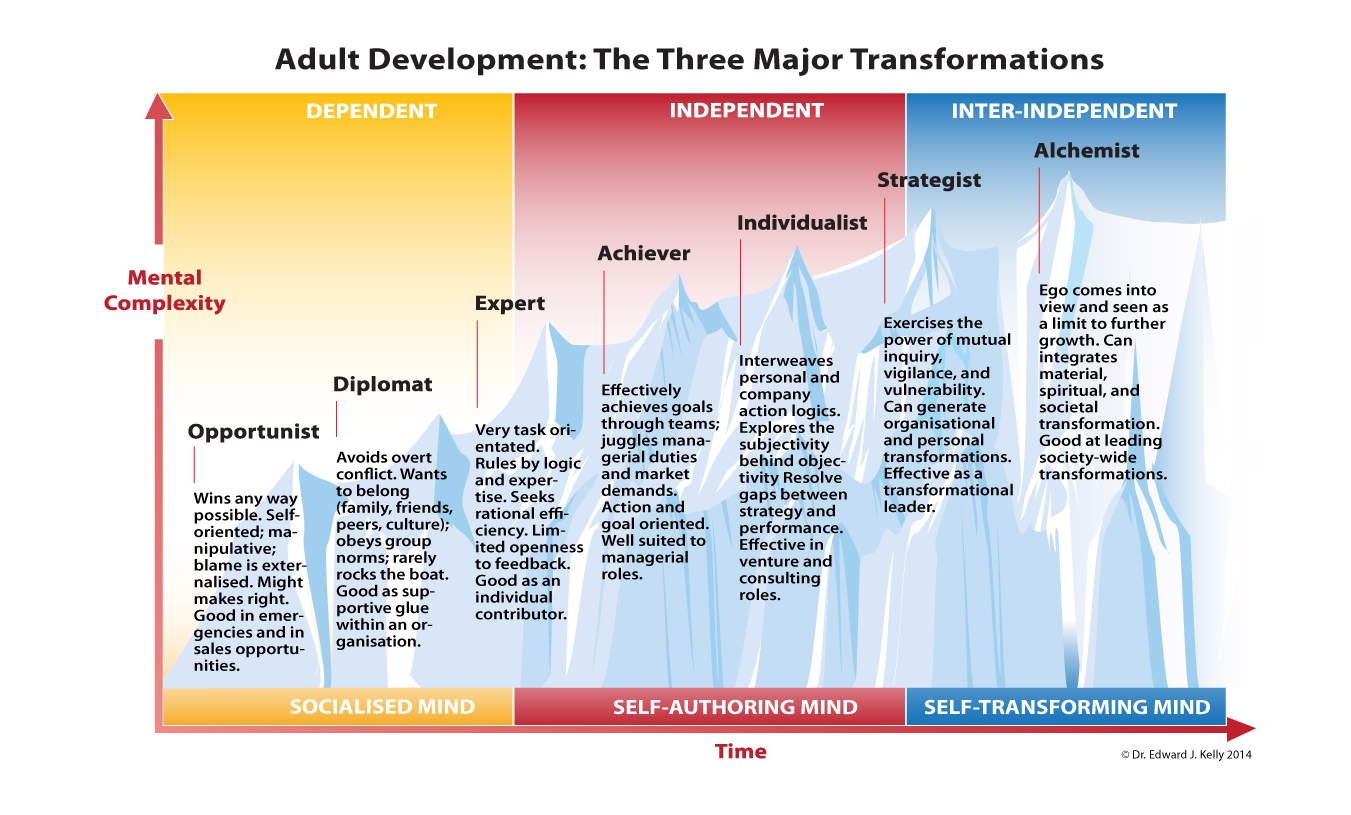Action Logics
According to adult development theory and empirical research over the past forty years (e.g. Kegan, 1982 and In Over Our Heads, 1994; Torbert, 1976, 1987, and Action Inquiry, 2004) people operate at different places along a continuum of action-logics.
These action-logics describe typical patterns in the way we act and interpret the actions of others. It is possible for a person can develop along this continuum from the Impulsive and Opportunist action-logics to the latest Alchemical and Ironic action-logics, although only a small percentage of the population actually do so.
Opportunist: Short time horizon, flouts power and sexuality, rejects feedback, hostile humor, deceptive, manipulative, externalizes blame, punishes, views luck as central, punishment rules, views rules as loss of freedom, “eye for an eye” ethic.
Diplomat: Observes rules, avoids inner and outer conflict, conforms, suppresses own desires, loyalty to group, seeks membership, right versus wrong attitude, appearance/status conscious, tends towards clichés, works to group standard.
Expert: Interested in problem solving via data, critical of others and self, chooses efficiency over effectiveness, perfectionist, values decisions based on merit, wants own performance to stand out, aware of alternative constructions in problem resolution but can be dogmatic, accepts feedback only from “objective” craft masters.
Achiever: Results and effectiveness oriented, long term goals, concerned with issues of ethics and justice, deliberately prioritises work tasks, future inspires, drawn to learning, seeks mutuality in relations, aware of personal patterns of behavior, feels guilt if does not meet own standards, blind to own shadow, chases time.
Re-defining: Collaborative, tolerant of individual difference, aware of context and contingency, may challenge group norms, aware of owning a perspective, inquiring and open to feedback, seeks independent, creative work, attracted by difference and change, may become something of a maverick, focuses on present and historical context.
Transforming: Process and goal oriented, strategic time horizon, systems conscious, enjoys a variety of roles, recognizes importance of principle and judgment, engaged in complex interweave of relationships, aware of own personal traits and shadow, high value on individuality, growth, self fulfilment, unique market niches, particular historical moments.
Alchemical: Alert to the theatre of action, embraces common humanity, disturbs paradigms of thought and action, dispels notions of heroic action, deeply internalized sense of self‐knowledge held with empty mind, sees light and dark, order and mess, treats time and events as symbolic, analogical, metaphorical (not merely linear, digital, literal).
The Opportunist action-logic is the first, and the Alchemical action-logic is the last, to date, that are reliably describable and measurable with developmental sentence-completion instruments.
The Opportunist action-logic consistently operates over the shortest time horizon, with the least degree of inquiry and with the most coercive degree of unilateral power. By contrast, later action-logics increasingly
- integrate multiple time horizons;
- engage in strategic inquiry into the present and future (not just scientific inquiry into the past);
- interweave many types of unilateral and mutual power to accomplish their collaborative intent; and
- recognise that only the timely exercise of mutual power generates non-violent transformation of self, teams, organizations, and personal relationships.
From a leadership perspective, the difference between those measured as Opportunist and those measured as Alchemical is between having no choice but to act opportunistically (Opportunist) and having that choice as well as a suite of other alternative leadership practices to choose from (Alchemical).
For more information please contact me.